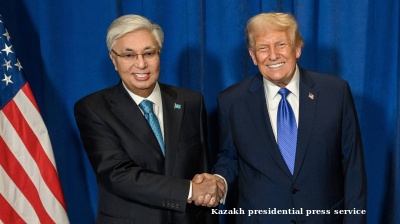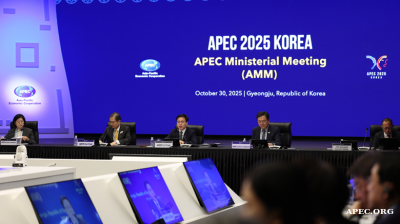Ukraine’s bid to join the EU has hit a wall, after efforts to launch the negotiations last week failed due to infighting amongst member states. Ukrainian President Volodymyr Zelenskiy has downgraded his country’s diplomatic representation by moving Ukraine’s long-serving EU ambassador, Olha Stefanishyna, who has been leading the talks moving for the last five years, to Washington as part of the recent reshuffle, where he hopes she will be more useful.
In a long interview with European Pravda, Stefanishyna explained that while the first stage of “screening” Ukraine’s laws – comparing them with EU laws to see if there are gaps or clashes – has largely been completed, the formal negations on the six “clusters” – the blocks of laws covering everything from trade to elections – has yet to start.
As bne IntelliNews reported in a deep dive on Ukraine’s EU accession bid, Kyiv is off to a good start, as the screen showed a lot of work has already been done on things like the Internal Market cluster and green energy, but there is still much more to do.
After months of lobbying EU member states, Bankova (Ukraine’s equivalent of the Kremlin) was hoping that the formal accession negotiations on the first of the clusters could begin on July 18. That deadline came and went without any progress.
In the middle of her interview, the news broke that Zelenskiy had appointed Stefanishyna to oversee another strategic area: relations with the United States. The move was planned, but for the autumn. It appears that the failure to open cluster negotiations this month triggered the president's decision to accelerate the switch.
The emphasis has switched back to the top level, where Zelenskiy and his top ministers will work to break the impasse. One of the reasons for her early departure, she told European Pravda, is that the EU is “not currently prepared to take the decisions” Ukraine expects.
“Now, further EU negotiations depend on the president communicating with EU leaders, and on diplomatic work. [Ukrainian Foreign Minister Andrii] Sybiha will continue to push this forward,” Stefanishyna told European Pravda.
“I think it happened because European institutions have shown they’re currently not ready to mobilise efforts and make the decision to open the first negotiating cluster,” said Stefanishyna. “This is despite the fact that the main political work has been done, the institutional framework is in place and the first screening stage went well. All the processes are functioning, but there is no political predictability about when even the first negotiating cluster might be opened.”
Deadlock
While Kyiv has a lot of support from other EU members for an accelerated membership process, Hungarian Prime Minister Viktor Orban has been a major obstacle actively blocking the start of the accession negotiations and campaigning to “do everything” to keep Ukraine out of the EU, claiming the EU cannot afford to take in such a large country. A unanimous vote of all 27 members is needed to close a cluster’s chapter once negotiations are completed, giving Budapest a de facto veto.
EU foreign policy chief and former Estonian Prime Minister Kaja Kallas, one of Ukraine’s most ardent advocates, says she has a Plan B to get started on the talks. It involves starting the negotiations but delaying the vote until such time as either a deal is done with Budapest, or Orban gets voted out of office. He is currently trailing in the polls and faces a general election next year. Kallas’ alternative plan is to strip Hungary of its EU voting rights.
According to Stefanishyna, it is not only Hungary that is uncertain about starting the talks, although she didn’t name any other countries in the interview, but did say: “We realised that the EU currently lacks political unity on this issue.”
Asked if it was not just Hungary that was a problem but "neighbours plural?” she replied: “Yes. But it taught us not to get offended or pick fights with neighbours. We adopted a policy of "unconditional love". Politicians come and go, elections happen, but relationships must endure, no matter what,” Stefanishyna said.
Deal needs to be done by the end of the year
The EC was preparing to open the first cluster on July 18 but then didn’t. Now the clock is ticking. Stefanishyna says there is still time to start the negotiations, but they need to start before the end of this year.
“Until 31 December 2025, it’s premature to say we failed. The clusters could be opened anytime, even all at once,” she said. “But I do think it’s unforgivable that EU institutions and member states have failed to find a way to get this decision made.”
However, despite her obvious disappointment, Stefanishyna has achieved a lot in her five years on the job and most of the infrastructure for the negotiation is now in place.
“The negotiation infrastructure is up and running. Each cluster has a dedicated lead negotiator. Even if ministries merge or split, that won’t change. European integration is now a vast, structured process. I’m confident it will go on working,” Stefanishyna said.
Negotiations on the clusters is a long and complicated process that will take years. In a recent interview European Commissioner for Enlargement Marta Kos was confident that Ukraine could be rushed through the process and join by 2030, although German Chancellor Friedrich Merz said last week that it will take longer than that and Ukraine is unlikely to join until 2035. While a lot of progress has been made with the nuts and bolts of business, the Internal Market cluster, experts say there are lot of thorny issues to resolve in the Fundamental cluster that covers things like the judiciary and anti-corruption measures, and reforming land rights has always been a political hot potato.
“Each group includes government officials, experts and MPs,” Stefanishyna said. “The preparatory work is nearly done. Last week, we finished screening the fourth [Green Agenda and Sustainable Connectivity] cluster. Most of the work is done. We just need the Commission’s assessments.”
All the commitments Ukraine has undertaken as part of the negotiation process – without transitional periods – have been limited to the end of 2027. The next two years will be used to develop decisions, and 2026-27 the Rada will adopt them.
“We’ve launched a major EU project called Ukraine2EU, which supports this process. There are experts, a methodological framework, and existing groundwork. And once the European Commission reports are available for each cluster, we’ll be able to approve the programme gradually, cluster by cluster,” says Stefanishyna. “When will it be adopted? That depends on internal politics and parliamentary priorities. But I see no reason to scale back these goals or make them less ambitious.”
Having missed one deadline to open negotiations, the new goal is to open all the negotiating clusters sometime in the second half of this year, and to complete the legislative amendments so that all of Ukraine’s laws fully align with EU law by the end of 2027, says Stefanishyna.
Features

BOTAŞ and Turkey’s hub ambition: from “30-year dream” to cross-border reality
For Ankara, the symbolism is as important as the molecules: Turkey’s energy map is shifting from end-market to hub.

Indian bank deposits to grow steadily in FY26 amid liquidity boost
Deposit growth at Indian banks is projected to remain adequate in FY2025-26, supported by an improved liquidity environment and regulatory measures that are expected to sustain credit expansion of 11–12%

What Central Asia wants out of the upcoming Washington summit
Clarity on critical minerals and a lot else.





